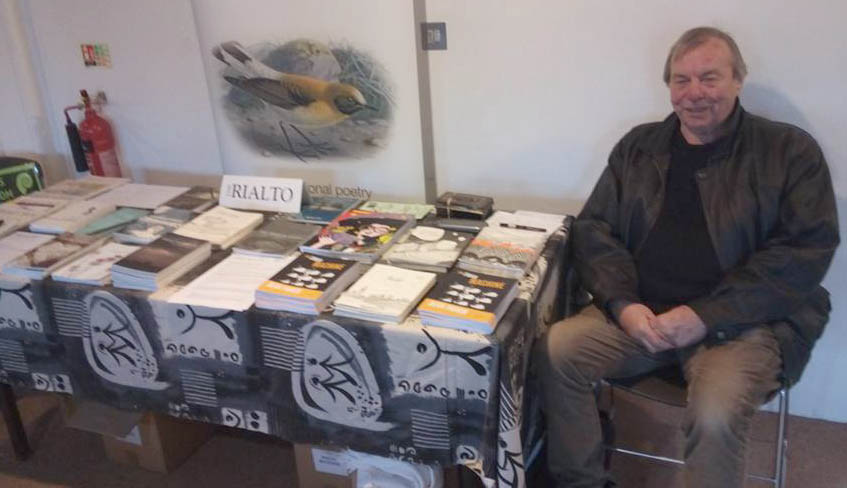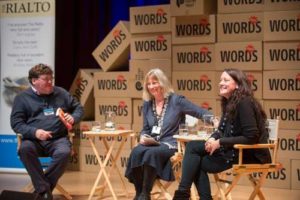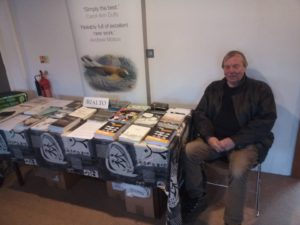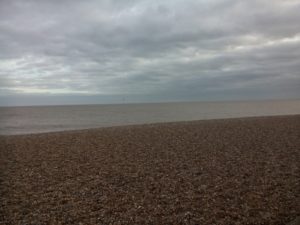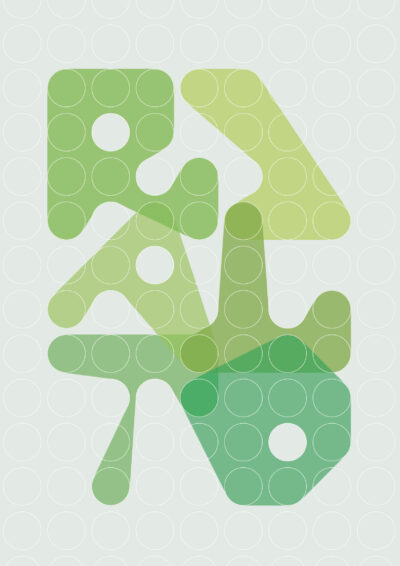Rialto 84 is out! Subscribers’ copies arriving around now. Otherwise you can get it here. Here’s our editorial, on this year’s Aldeburgh Poetry Festival (written before the sad news about the Poetry Trust) and on some of the poems in this issue. First Michael, then Fiona.
The Rialto sponsored the Friday evening Conversation at this year’s Aldeburgh Poetry Festival. It was originally to have been between Richard Mabey and John Burnside but Mr Mabey was unwell and his place was taken by Helen Macdonald (aka H is for Hawk). I was very taken with John Burnside’s comment that what most people see when they look at the countryside (most often through a car window I suspect) is landscape – they see trees, fields, hills etc., and assume all is as it should be: they don’t see the absence of life, the missing plants, insects, birds. Helen Macdonald joined in with an anecdote about taking a twelve year old to Wicken Fen. Having seen the rich variety of bird and insect life the child asks, ‘where do they get all these creatures from? do they get them from a zoo?’
I was glad to hear two speakers, certainly younger than I am, articulating a persistent anxiety I have that I belong to a vanishing generation, one that still recalls abundant nature. As a child (a proper little Fotherington-Thomas) I ran through fields of clover crowded with butterflies and bees: even as a student I remember meadows in Dentdale packed with orchids and other species, with a ring ouzel singing in a nearby wood. It’s pretty much all gone. Worthy organizations like Birdlife International and Plantlife chip away with their silver teaspoons at the iceberg of indifference and greed that lumbers along sinking every attempt to alter the constant degradation of our planet’s biosphere. Humankind might quite quickly go extinct. As Burnside remarked the planet has been a ball of fire and a ball of ice, it won’t lament. We might become a footnote in cosmic history, a rapacious creature that drowned in its own effluent.
We are, of course, capable of redemption. Poetry is a symptom of that capacity and quality, though it’s hard not to feel that poetry, like nature, is being pushed to the margins of our culture, the small Reservations that are dotted about the earth.
But enough of that for now. One of the passers-by at The Rialto’s stall at the festival (and I was sincerely surprised and delighted by the number of people who told me how important publication in the magazine had been for them – thank you) spoke to me about the eclecticism of the magazine and how successfully the different types and styles of poems were fitted together. John Wakeman and I used to claim that we were ‘deliberately eclectic’. In the fields of counselling and psychotherapy the ‘eclecticism’ of the late twentieth century gave way before the more rigorous ‘Integrative Theory’ of the oughties. This issue certainly has considerable varieties of poetic form and practice. It prompts me to wonder if what we are trying for with The Rialto is an integrative recognition that all poetry holds together, that the aims and affects all link up and that no matter how variously the practitioners present their work we, the readers, can experience a frisson, a click in head and/or heart that is enlivening and moves us on.
We’d like to know more of what you think. We’d like you to tell us which poems work for you and which ones don’t. I suspect you might want us to explain some of our choices instead of taking refuge under umbrella sentiments like ‘so long as a poem works in its own terms’. Challenge us, please.
Michael Mackmin
Michael emailed to say he’d found an interesting poet. He doesn’t say such things lightly. My reaction was envy (this poet had turned up in one of his folders, not mine), curiosity, and then excitement on reading Zeina Hashem Beck’s ‘Ode to my non-Arabic Lover’ – the way it embraces its own contradictions, love/not love, dark/noon, forgetting English (in English), all that in the first three lines and resurfacing, changed, at the end; the relationship’s lurking Orientalism, which may invite readers to examine their reaction to the poem itself; the speaker’s tone of sweet, light sadness. There’s a journey poem with the same lover and a long poem ‘for refugees’ containing a chain of images: surreal, brutal, despairing, beautiful… Zeina reads this one, ‘Naming Things’, on YouTube, here. Such poems play out against the horror of recent weeks, months, years, and straight after them Anton Rose’s ‘Blood on your Hands’ takes the longer view of us, the street-thronging crowds.
Those first four send echoes bouncing through the issue. Arabic reappears in unexpected form in Ed Doegar’s ‘Underground’. Borders, kingdoms and language change, are displaced or decay in poems by Raymond Antrobus, Peter Bland, Cristina Haraba, Cami Garcia and David Sergeant. Human and geographical extremes are charted by Amy McCauley in ‘CaNToS of JoaN’, Lucy Hamilton, Alice Miller and others. Elsa Fischer counts improbably large piles of the dead and Sam Gardiner of cash.
Each of the sixty or so poems carries an untold story of how the writer ‘caught’ it. Then there’s the editors’ story in my head – who read it first, what she/he thought, whether we agreed straight off or one of us needed convincing, whether the poem brought immediate delight or worked on us more slowly. Readers, now it’s your turn.
Fiona Moore
